Sources
![]() This article incorporates text from a free content work. Text taken from
This article incorporates text from a free content work. Text taken from
In Australian Aboriginal mythology, Ulanji is a snake-ancestor of the Binbinga. He bit the heads off some flying foxes and took out two of their ribs and their heart. Ulanji emerged from the ground at a place called Markumundana. He walked along to a large hill, Windilumba, where he made a spring, and also a mountain close by. He crossed what is now known as the Limmen Creek, and made a range of hills and a valley, with a large number of water-holes and plenty of lilies in them. He left behind numbers of Ulanji spirits, which emanated from his body, wherever he performed ceremonies. After travelling over a great extent of country, and making many mungai (totem animal) spots, he finally went into the ground at a water-hole called Uminiwura. [1]
The Binbinga believe that both men and women can see the spirit children at the mungai spots.
![]() This article incorporates text from a free content work. Text taken from
This article incorporates text from a free content work. Text taken from
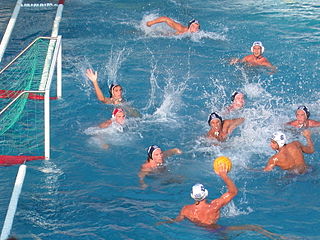
Water polo is a competitive team sport played in water between two teams of seven players each. The game consists of four quarters in which the two teams attempt to score goals by throwing the ball into the opposing team's goal. The team with the most goals at the end of the game wins the match. Each team is made up of six field players and one goalkeeper. Excluding the goalkeeper, players participate in both offensive and defensive roles. Water polo is typically played in an all-deep pool so that players cannot touch the bottom.
Wollunqua, also written Wollunka or Wollunkua, is a snake-god of rain and fertility in Australian Aboriginal mythology of the Warramunga people of the Northern Territory of Australia, a variation of the "Rainbow Serpent" present in the mythology of many other Aboriginal Australian peoples. The snake, which emerged from a watering hole called Kadjinara in the Murchison Ranges, is said to be many miles long. When speaking of the Wollunqua snake in public, the name urkulu nappaurinnia is used, because if they were to call it too often by its real name they would lose control and it would come out and devour them all. It can place the rainbow in the sky at will.
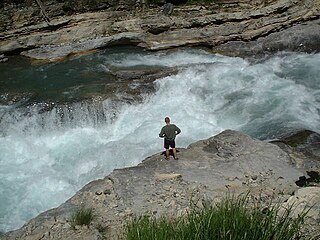
Whitewater forms in a rapid context, in particular, when a river's gradient changes enough to generate so much turbulence that air is trapped within the water. This forms an unstable current that froths, making the water appear opaque and white.
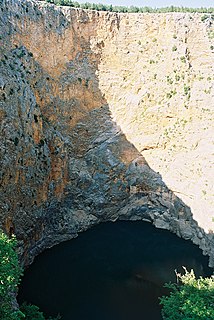
A sinkhole is a depression or hole in the ground caused by some form of collapse of the surface layer. The term is sometimes used to refer to doline, enclosed depressions that are locally also known as vrtače and shakeholes, and to openings where surface water enters into underground passages known as ponor, swallow hole or swallet. A cenote is a type of sinkhole that exposes groundwater underneath. A sink or stream sink are more general terms for sites that drain surface water, possibly by infiltration into sediment or crumbled rock.
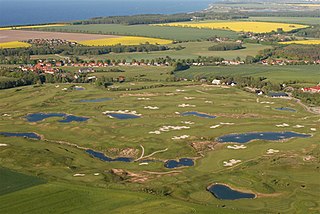
A golf course is the grounds where the sport of golf is played. It consists of a series of holes, each consisting of a tee box, a fairway, the rough and other hazards, and a green with a cylindrical hole in the ground, known as a "cup". The cup holds a flagstick, known as a "pin". A standard round of golf consists of 18 holes. Most courses contain 18 holes; some share fairways or greens, and a subset has nine holes, played twice per round. Par-3 courses consist of nine or 18 holes all of which have a par of three strokes.

Safa and Marwa are two small hills, connected to the larger Abu Qubais and Qaiqan mountains, respectively, in Mecca, Saudi Arabia, now made part of the Masjid al-Haram. Muslims travel back and forth between them seven times in what is known as Sa'ee ritual pilgrimages of Ḥajj and Umrah.
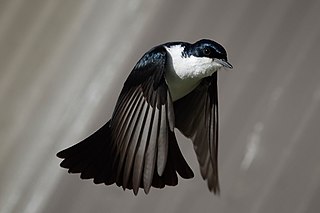
The restless flycatcher, or restless myiagra, is a passerine bird in the family Monarchidae; it is also known as the razor grinder or scissors grinder because of its distinctive call. It is a native of eastern and southern Australia. Populations in New Guinea and northern Australia, which were at one time considered to be a subspecies, are now accepted as a separate species, the paperbark flycatcher. It is a small to medium-sized bird and has similar colouring to the willie wagtail.

A hazard is an area of a golf course in the sport of golf which provides a difficult obstacle, which may be of two types: (1) water hazards such as lakes and rivers; and (2) man-made hazards such as bunkers. The governing body for the game of golf outside the US and Canada, The R&A, say that A "hazard" is any bunker or water hazard. Special rules apply to play balls that fall in a hazard. For example, a player may not touch the ground with their club before playing a ball, not even for a practice swing. A ball in any hazard may be played as it lies without penalty. If it cannot be played from the hazard, the ball may be hit from another location, generally with a penalty of one stroke. The Rules of Golf govern exactly from where the ball may be played outside a hazard. Bunkers are shallow pits filled with sand and generally incorporating a raised lip or barrier, from which the ball is more difficult to play than from grass.
Belpahar is a town and a municipality in Jharsuguda district in the state of Odisha, India. Belpahar is famous for its geographical location, as it is the center for many coal mines areas nearby. Krosaki TRL Limited is located in Belpahar while there is Mahanadi Coalfields Limited and Ib Thermal Power station in the vicinity. It has a railway station which levels 55 metres high above the sea level. This area is among the fastest-growing industrial zones in Odisha.

Hinagdanan Cave is a cave in the municipality of Dauis on Panglao Island, in Bohol Province, in the Philippines. It is a naturally lighted cavern with a deep lagoon and many large stalactites and stalagmites.

The Lerderderg River is a perennial river of the Port Phillip catchment, located in the Western District region of the Australian state of Victoria.

The tree martin is a member of the swallow family of passerine birds. It breeds in Australia, mostly south of latitude 20°S and on Timor island. It is migratory, wintering through most of Australia, New Guinea, Indonesia east of the Wallace Line and the Solomon Islands. It is a vagrant to New Zealand, where it has bred, and New Caledonia. This species is frequently placed in the genus Hirundo as Hirundo nigricans.

Talbot is a town in Victoria, Australia. At the 2016 census, Talbot had a population of 442.
A rock-cut basin, in this usage of the term, is a natural phenomenon. They are cylindrical depressions cut into stream or river beds, often filled with water. Such plucked-bedrock pits are created by kolks; powerful vortices within the water currents which spin small boulders around, eroding out these rock basins by their abrasive action. These basins are frequently found in streams and rivers with a relatively soft rock substrates such as limestones and sandstones. The rather unusual and man-made appearance of such depressions has led to various folk-tales becoming associated with them, such as their identification as petrosomatoglyphs, including knee prints, elbow prints, etc. of saints, heroes, kings or supernatural beings.

A well is an excavation or structure created in the ground by digging, driving, or drilling to access liquid resources, usually water. The oldest and most common kind of well is a water well, to access groundwater in underground aquifers. The well water is drawn up by a pump, or using containers, such as buckets, that are raised mechanically or by hand. Water can also be injected back into the aquifer through the well. Wells were first constructed at least eight thousand years ago and historically vary in construction from a simple scoop in the sediment of a dry watercourse to the qanats of Iran, and the stepwells and sakiehs of India. Placing a lining in the well shaft helps create stability, and linings of wood or wickerwork date back at least as far as the Iron Age.

Querrieu is a commune in the Somme department in Hauts-de-France in northern France.

Golf is a club-and-ball sport in which players use various clubs to hit balls into a series of holes on a course in as few strokes as possible.
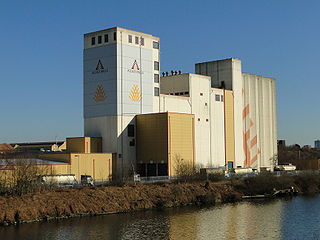
A gristmill grinds cereal grain into flour and middlings. The term can refer to either the grinding mechanism or the building that holds it. Grist is grain that has been separated from its chaff in preparation for grinding.
The Binbinga, also pronounced Binbinka, are an Indigenous Australian people of the Northern Territory of Australia.

A hole is an opening in or through a particular medium, usually a solid body. Holes occur through natural and artificial processes, and may be useful for various purposes, or may represent a problem needing to be addressed in many fields of engineering. Depending on the material and the placement, a hole may be an indentation in a surface, or may pass completely through that surface. In engineering, a hole may be blind or through if it is partial or complete depth.